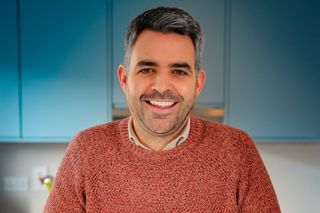Genetic testing on embryos helped us have our miracle baby free from a life-limiting disorder
PGD is derided by some as a means of creating 'designer babies', but as the O'Connor family shows, in reality it means so much more.
Megan O'Connor is a truly cherished baby - like all newborns, the nine-week-old girl is a source of wonder to her parents. But for John and Emma, their third daughter is extra special as she is the first baby in the world to be born free of a fatal condition, mucolipidosis, as a result of revolutionary PGD (pre-implantation genetic diagnosis) treatment.
Eight years ago, Megan's eldest sister Aoibhe was born with the progressively debilitating disorder as both parents are carriers - and while their second daughter, Lauren (now 5) was unaffected, the couple didn't want to risk having another child with the life-limiting disorder. So when help was offered, they decided to take it.
"When I was pregnant with Aoibhe, I had no idea that she would have anything wrong with her," says Emma. "But she was diagnosed when she was a year old with a condition called mucolipidosis (ML), which is so rare that she is the only person in the country with it.
"Needless to say, we were shocked and devastated. So when I became pregnant again, we decided to have an amniocentesis to see if the baby was affected by ML but that resulted in miscarriage. So when I was expecting Lauren, we didn't want to take the risk, and luckily it paid off as she is fine.
"But we didn't want to take the chance again and decided to go down a different route with Megan."
John and Emma began intrauterine insemination (IUI) with donor sperm, and after a couple of unsuccessful years, they were told about PGD/IVF.
This was their last chance as they had run out of money and had endured several unsuccessful pregnancies, but PGD offered a real chance for them to have their much-wanted third child.
"A nurse told us about PGD when we were on what would be our final cycle. It was the 'last chance saloon' for us," says John. "When we discovered we could do it at Cork Fertility Centre, we were really interested. We met with Dr Waterstone at the clinic and he explained the process and success rate.
"He told us that if successful we would be the second PGD in Ireland and the first in the world for mucolipdosis with karyomapping (a new method of detecting a wide range of genetic diseases in embryos) and, most importantly, we would have an unaffected child.
"So we jumped at the chance, particularly as it meant we wouldn't have to use donor sperm so the baby would be our own."
The couple started the process in April 2014 and like anyone undergoing fertility treatment, had an anxious wait until they discovered that the pregnancy was successful and their unborn baby was free of illness.
"My eggs were taken out in April last year and after fertilisation, the embryos were sent away to be tested," says Emma.
"We then had to wait for results to show if any of them were free from ML - luckily one of them showed that it wasn't a carrier so I had it implanted back in July and then we had the agonising wait until the 20-week scan to see if everything was progressing normally.
"Despite the scans showing that everything seemed fine, I really couldn't relax until Megan was born (on March 24, 2015)."
"We are so grateful to Dr Waterstone and the other staff at the Cork Fertility Centre," John says. "They very professional but also extremely caring.
"Emma had to inject and take various prescriptions on a daily basis. She also had numerous scans and different procedures during the initial treatment and the course of the pregnancy; but she was brilliant. She was a friend, wife, mother and carer (she is Aoibhe's full-time carer) throughout our fertility treatment and never complained."
Emma says despite what some people may think of PGD, it has made such a huge difference to their lives. "I have heard people describe PGD as a means of getting a 'designer baby', but it was nothing like that for us," she says.
"Aoibhe has had a very hard time of it and it would have been so unfair to knowingly put another child through the same thing.
"When they get older, we will tell the children about Megan's story but for the meantime, we are just overjoyed with the outcome and delighted to be out the other side of the treatment."
www.corkfertilitycentre.com
www.mpssociety.org
About PGD
• Pre-implantation genetic diagnosis (PGD) involves the diagnosis of a genetic condition prior to achievement of a pregnancy
• The process involves generating a number of pre-implantation embryos through IVF treatment and checking the genes of those embryos for the condition involved before transferring them to the uterus of the female partner; only embryos that do not have the condition are transferred
• Cork Fertility Centre uses PGD with karyomapping for a large number of genetic disorders, including cystic fibrosis, fragile X syndrome, Duchenne muscular dystrophy, myotonic dystrophy and haemophilia A.
• PGD is suitable for couples hoping to conceive who:
- Already have a child with a serious genetic condition
- Have a family history of a serious genetic condition, or have the condition themselves
- Are both carriers for a serious genetic condition
• The O'Connors are the first couple in the world to have a baby from PGD with karyomapping for the condition mucolipidosis. They are the second family to have had a baby as a result of PGD carried out in Ireland
• PGD is a preventative measure, used to avoid children being born with life-limiting and debilitating genetic diseases to parents known to be at risk
• It is a very high-end medical procedure. Consequently, it is expensive, costing €10,000-€14,000, depending on the condition involved.
• Pre-implantation genetic diagnosis (PGD) involves the diagnosis of a genetic condition prior to achievement of a pregnancy
• The process involves generating a number of pre-implantation embryos through IVF treatment and checking the genes of those embryos for the condition involved before transferring them to the uterus of the female partner; only embryos that do not have the condition are transferred
• Cork Fertility Centre uses PGD with karyomapping for a number of genetic disorders, including cystic fibrosis, fragile X syndrome, Duchenne muscular dystrophy, myotonic dystrophy and haemophilia A.
• PGD is suitable for couples hoping to conceive who already have a child with a serious genetic condition or when both are carriers for a serious genetic condition
• It costs €10,000 - €14,000
Join the Irish Independent WhatsApp channel
Stay up to date with all the latest news














